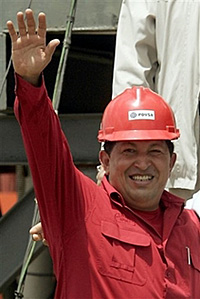 |
 |
 |
 News from Around the Americas | May 2007 News from Around the Americas | May 2007  
Venezuela Pulls Control From Big Oil
 Reuters Reuters


| | Venezuelan President 's government took over Venezuela's last remaining privately run oil fields in the Orinoco River region on Tuesday, intensifying a decisive struggle with Big Oil over the future of one of the world's most lucrative oil deposits. (AP/Fernando Llano) |
President Hugo Chavez makes an attempt to reclaim resources by taking operational control of the Orinoco Belt.

Puerto Piritu, Venezuela - President Hugo Chavez's government took over Venezuela's last remaining privately run oil fields Tuesday, intensifying a decisive struggle with Big Oil over one of the world's most lucrative deposits.

Oil Minister Rafael Ramirez declared that the oil fields had reverted to state control just after midnight. Television footage showed workers in hard hats raising the flags of Venezuela and the national oil company at a refinery and four drilling fields in the oil-rich Orinoco River basin. Chavez planned a more elaborate celebration Tuesday afternoon with red-clad oil workers, soldiers and a fly over by Russian-made fighter jets.

The companies ceding control include BP Plc (Charts), ConocoPhillips (Charts, Fortune 500), Exxon Mobil (Charts, Fortune 500)., Chevron (Charts, Fortune 500), France's Total SA (Charts) and Norway's Statoil ASA (Charts). All but ConocoPhillips have agreed in principle to state control, and Venezuela has warned it may expropriate that company's assets if it doesn't follow suit.

Despite the fanfare, these companies remain locked in a behind-the-scenes struggle with the Chavez government, and appear to be taking a decisive stand, demanding conditions - and presumably compensation - to convince them that Venezuela will continue to be good business.

Chevron's future in Venezuela "will very much be dependent on how we're treated in the current negotiation," said David O'Reilly, chief executive of the San Ramon, Calif.-based company. "That process is going to have a direct impact on our appetite going forward."

Chavez says the state oil company, PDVSA, is assuming at least 60 percent of each of the Orinoco operations, but has invited the companies to stay as minority partners. They have until June 26 to negotiate the terms, including compensation and reduced stakes.

"We are going to take over some oil fields that have continued to be in the hands of transnationals," Chavez said Sunday, calling it "the last step" in recovering state sovereignty over oil.

Forcing the world's biggest multinational oil companies to cede majority control of their joint operations in Venezuela's most promising oil fields is the culmination of a nationalist drive by Chavez that has increasingly squeezed the industry of profits.

The stakes are high for both sides.

If he can persuade the foreign companies to stay, Venezuela will be on track to develop the planet's largest known oil deposit and possibly surpass Saudi Arabia as the nation with the most reserves. But if he scares them away, the Orinoco River region could end up starved of the investment and know-how needed to transform the Orinoco's tar-lake crude into marketable crude oil.

While Chavez says state firms from China, India and elsewhere can step in, industry experts doubt they are qualified.

Amid the turmoil, new investment from the private companies has already dried up.

But for the companies, pulling out of the Orinoco would be damaging.

They have invested more than $17 billion in the projects, now estimated to be worth $30 billion. Venezuela has indicated it may just pay the lesser amount, using oil and tax forgiveness to further reduce the cash payout.

But three-quarters of the world's proven reserves are already controlled by state monopolies, so Venezuela may still prove enticing.

Nationalization of the oil industry has been tried in Venezuela before. Venezuela completely shut private companies out of the oil sector between 1975 and 1992 before a series of partial privatizations. | 
 | |
 |



